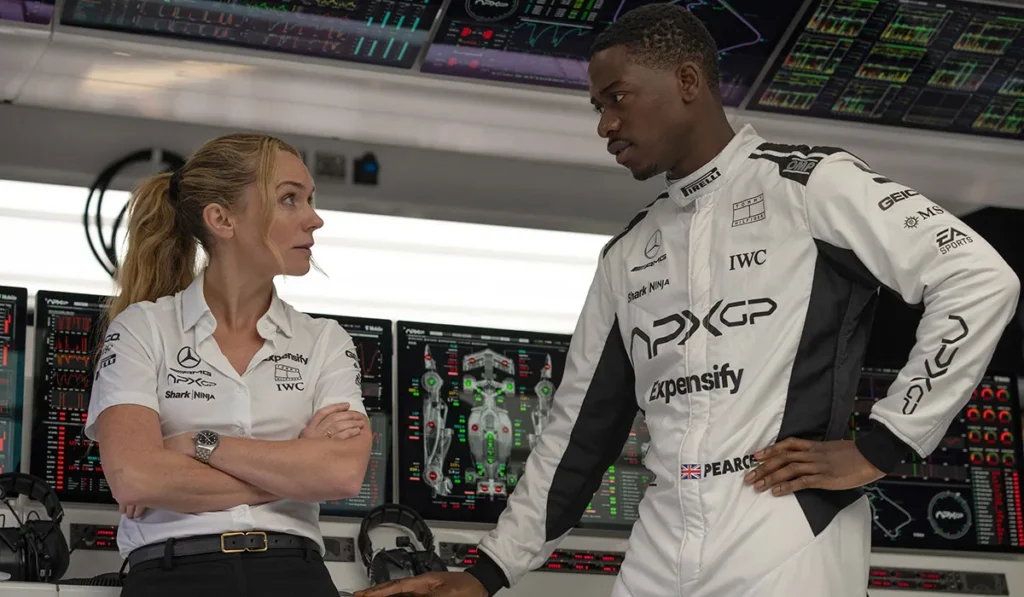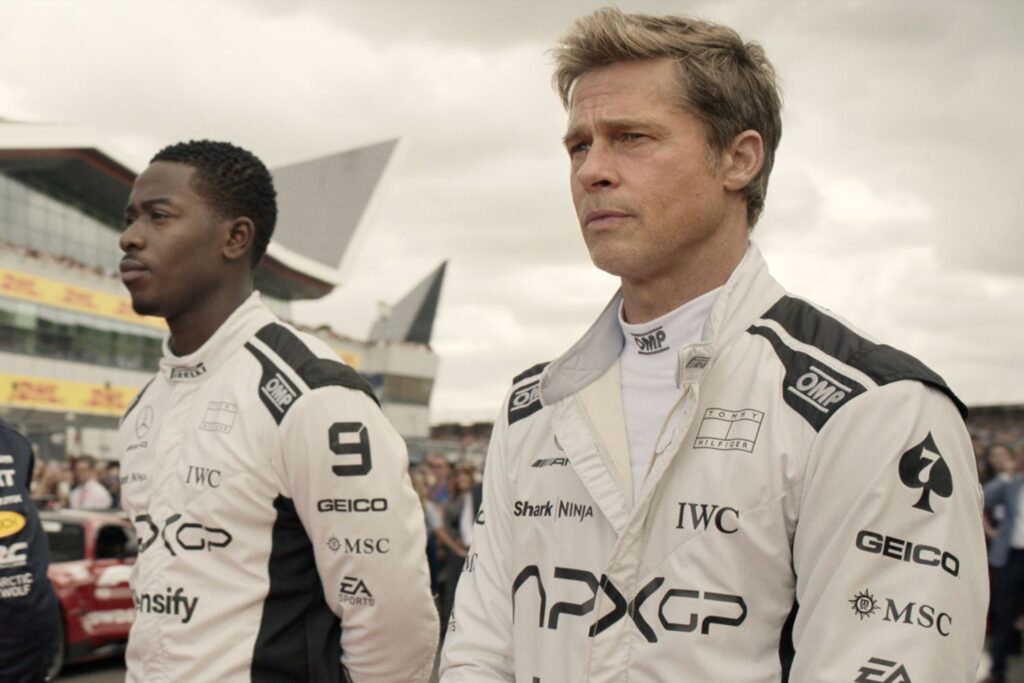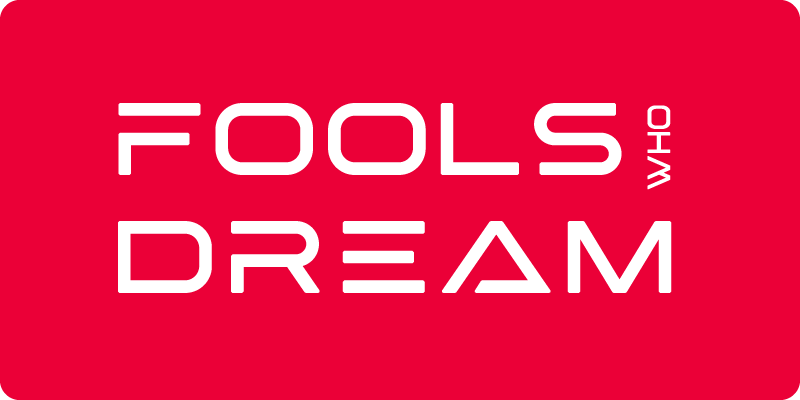Joseph Kosinski’s “F1” starts with Sonny Hayes (Brad Pitt) dreaming of ocean waves, eating a stack of sandwiches, and swaggering toward a racetrack, his back to the camera. (The film treats its star like a sexy basilisk: It carefully considers when to look him directly in the eye.)
Those images distill Sonny’s troubled mind and turbulent routine, but they’re slightly lugubrious in the context of race car cinema, given that “Talladega Nights” (2006) grabbed our collective gaze with a mere 10 words: “America is all about speed. Hot, nasty, badass speed.”
Impishly misattributed to Eleanor Roosevelt in “Talladega,” that quote looms over “F1,” a racing flick that rejects prankish satire in order to make speed hot, nasty, and badass again—even if it makes the movie feel more like a Formula One commercial than a feature film.
“Why do we do this?” wonders Ruben Cervantes (Javier Bardem), Sonny’s rival-turned-mentor. “What’s wrong with tennis or golf?” Nothing at all, except that the PGA Tour probably wouldn’t bet on a $200 million blockbuster about Brad Pitt scoring a hole in one (though LIV Golf might).
Decrying a summer spectacle for being engineered to make a buck may be churlish and naïve, but I expect slightly higher callings from Kosinski, whose handiwork includes the sci-fi dreamscapes of “Tron: Legacy” (2010) and the rousing melodrama of “Top Gun: Maverick” (2022).
“The thing about perfection is that it’s unknowable,” Kevin Flynn (Jeff Bridges) declares in “Legacy.” For the past 15 years, Kosinski has fought to prove him wrong, mounting each of his epics with the precision of a glassblower and the guts of a romantic.
Romance is the spark of every Kosinski joint (I still swoon when Tom Cruise embraces Jennifer Connelly on a dark beach in Miramar in “Maverick”) and “F1” is no exception, despite the fact that Sonny’s passion is for burning rubber, not making whoopee.

“I need this,” Sonny tells Ruben, who recruits him to join his flailing Formula One team, APXGP. Sonny comes with a history of conquest and defeat—he once drove a taxi to pay the bills—but with $350 million in debts, Ruben is desperate.
“You’ve never let me down,” Ruben tells his old friend. “Well, there’s still time,” Sonny replies, foreshadowing his destructive spats with Joshua Pearce (Damson Idris), a young APXGP driver who chafes at his aging teammate’s look-at-me obstinance.
“I climbed a mountain to get here, bro,” Joshua informs Sonny. That’s as close as the film swerves toward social commentary, illuminating the divergent perspectives of a white has-been gifted a second chance and a rising Black star struggling to outrun his rookie status.
A more playful animosity builds between Sonny and Kate McKenna (Kerry Condon), APXGP’s technical director. “My job is wind,” Kate proclaims. “So it helps to feel it.” She proves her point by passing Sonny on a country road packed with cows, her sleek bicycle beating his chunky jeep.
Improbably, this turns out to be the most exhilarating bout of vehicular warfare in a film featuring races in Italy, Belgium, Las Vegas, and Abu Dhabi. A far cry from the varied terrain of “Maverick” (sand, water, snow), each Formula One track is pretty much the same: long, hard, and round.
“Sometimes there’s this moment when I’m in the car when everything is peaceful and no one can catch me,” Sonny says. He’s right, if only because cinematographer Claudio Miranda imbues the races with frictionless grace, making them look both beautiful and distant.
Per the Kosinski playbook, “F1” grows more tactile as the likelihood of love emerges. “We need to build our car for combat,” Sonny tells Kate, requesting a round of tinkering. Her response? Finish a race first, a comically low bar that Sonny gleefully clears.
Sonny’s subsequent winning streak primes us for a delightful poker game, which crystalizes the film’s romantic and bro-mantic relationships. By purposely losing to Joshua via sleight of hand, Sonny reveals that he cares more about his compatriot than he appears to—and wins Kate’s affection in the process.
“When you look in the mirror, you see this rough-and-tumble, old-school cowboy,” Kate says, teasingly sizing up Sonny. She understands that smug, stoic outlaws are dull until they’re threatened with domestication, a possibility “F1” toys with to ultimately noncommittal effect.

Ruminating on Sonny and Kate’s flirtation, I remembered a scene from Kosinski’s “Only the Brave” (2017) where Marvel Steinbrink (Andie MacDowell) sums up the plight of a firefighter’s wife: “It’s not easy sharing your man with a fire.”
While there’s passivity in those words, the reactionary sheen of Kosinski’s characters can be deceptive. He’s hardly a model feminist, but it’s notable that he makes movies about men and women alike who demand and earn respect.
“Don’t be shitty to yourself,” Sonny tells Jodie (Callie Cooke), a mechanic whose mistake may have cost the team a race. She’s grateful for his compassion, yet implores him not to stick up for her publicly, recognizing that the perception of being able to take care of yourself is precious capital.
If the resentment-to-reconciliation evolution of Sonny and Joshua’s friendship had the heft of a single scene between Sonny and Jodie, “F1” might have blossomed into more than a 155-minute PSA (the film was made in collaboration with FIA, the governing body of Formula One, and champion driver Lewis Hamilton).
“Money, fame, free clothes,” Joshua says when asked why he races. It’s meant as a joke, but Ehren Kruger’s narratively undernourished screenplay and the reliably repetitive races intimate that “F1” is invested not in enveloping you in an experience, but in force-feeding you a product.
“I’m offering you an open seat in Formula One—the only place you can say if you win, you are the absolute best in the world,” Ruben insists to Sonny. Translation: Formula One is the best, along with its steadfast corporate partners.
(Me and my fellow Oregon moviegoers can take capitalistic pride in the film’s courtship of Expensify, the software company that took over Portland’s First National Bank Building and paid an undisclosed sum to have its logo splashed across Pitt’s snug racing jumpsuit).
A veteran of video game commercials, Kosinski has used his films to sell virtual reality, wildfire fighters, and America itself. He’s an instinctive propagandist, but his portrayal of Formula One lacks the grandeur of his past obsessions, manifesting as an industry with much velocity and minimal feeling.
“It’s not about the money,” Sonny insists when a waitress asks why he wants to be a Formula One racer. “So what is it about?” she probes. Sonny doesn’t answer, but his silence speaks a numbing truth: While America is all about speed, racing is all about the sell. The cold, polite, buttock-free sell.




One Response